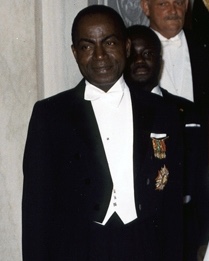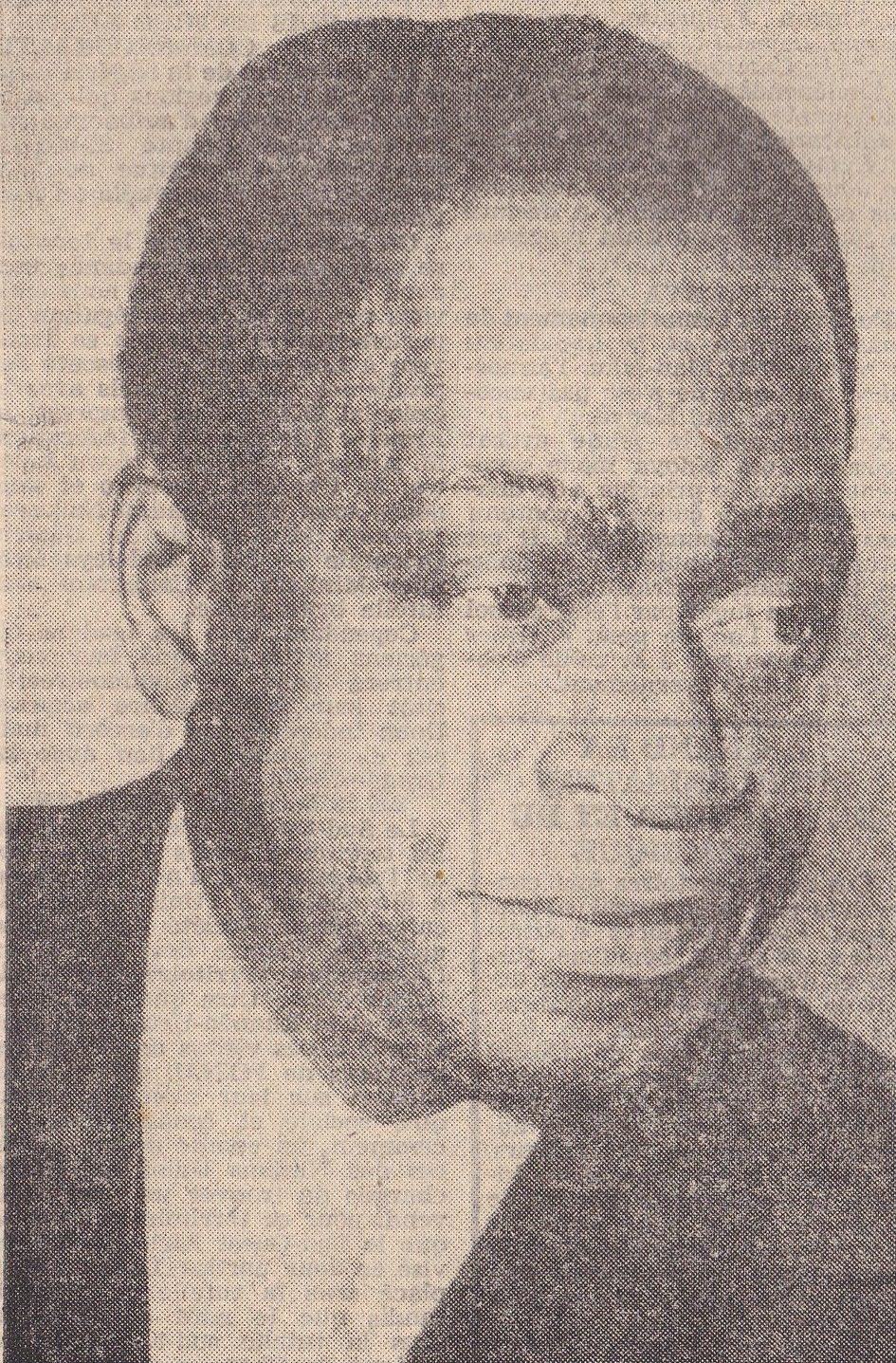|
1960 Ivorian General Election
General elections were held in Ivory Coast on 27 November 1960 to elect a President and National Assembly. Under the constitution enacted that year, the country was officially a one-party state with the Democratic Party of Ivory Coast – African Democratic Rally (PDCI-RDA) as the sole legal party. Its leader, Félix Houphouët-Boigny, was automatically elected to a five-year term as president and unanimously confirmed in office via a referendum. A single list of PDCI-RDA candidates won all 70 seats in the National Assembly. Voter turnout was 95.9% in the parliamentary election and 98.8% in the presidential election.Dieter Nohlen, Michael Krennerich & Bernhard Thibaut (1999) ''Elections in Africa: A data handbook'', pp308-310 Results President National Assembly References {{Ivorian elections Ivory Ivory is a hard, white material from the tusks (traditionally from elephants) and teeth of animals, that consists mainly of dentine, one of the physical structures of teeth ... [...More Info...] [...Related Items...] OR: [Wikipedia] [Google] [Baidu] |
Côte D'Ivoire
Ivory Coast, also known as Côte d'Ivoire, officially the Republic of Côte d'Ivoire, is a country on the southern coast of West Africa. Its capital is Yamoussoukro, in the centre of the country, while its largest city and economic centre is the port city of Abidjan. It borders Guinea to the northwest, Liberia to the west, Mali to the northwest, Burkina Faso to the northeast, Ghana to the east, and the Gulf of Guinea (Atlantic Ocean) to the south. Its official language is French, and indigenous languages are also widely used, including Bété, Baoulé, Dioula, Dan, Anyin, and Cebaara Senufo. In total, there are around 78 different languages spoken in Ivory Coast. The country has a religiously diverse population, including numerous followers of Christianity, Islam, and indigenous faiths. Before its colonization by Europeans, Ivory Coast was home to several states, including Gyaaman, the Kong Empire, and Baoulé. The area became a protectorate of France in 1843 and ... [...More Info...] [...Related Items...] OR: [Wikipedia] [Google] [Baidu] |
List Of Heads Of State Of Ivory Coast
This article lists the heads of state of Ivory Coast, officially the Ivory Coast, Republic of Côte d'Ivoire, since the country gained independence from France in 1960. Alassane Ouattara has been serving as President of Ivory Coast since 4 December 2010. List Key ;Political parties * * * ;Other factions * ;Symbols * Elected unopposed * Died in office Officeholders Notes Timeline Latest election See also *Ivory Coast **Vice President of Ivory Coast **List of heads of government of Ivory Coast **List of colonial governors of Ivory Coast **First Lady of Ivory Coast **Politics of Ivory Coast *Lists of office-holders Sources * http://www.rulers.org * ''Guinness Book of Kings Rulers & Statesmen, Clive Carpenter, Guinness Superlatives Ltd'' References {{Heads of state and government of Africa Lists of national presidents, i Presidents of Ivory Coast, * Heads of state of Ivory Coast Lists of Ivorian people by occupation, Heads of state 1960 establishments in Ivo ... [...More Info...] [...Related Items...] OR: [Wikipedia] [Google] [Baidu] |
National Assembly Of Ivory Coast
The National Assembly is lower house of the Parliament of Ivory Coast since November 2016. From 1960 to 2016, the National Assembly was Ivory Coast's unicameral legislative body. Evolved from semi-representative bodies of the French Colonial period, the first National Assembly was constituted on 27 November 1960 with 70 elected members (''députés'') in accordance with the Constitution of 31 October 1960, which created the First Republic. Legislative power in Ivory Coast is exercised by Deputies elected from Constituencies (''Circonscriptions'') by a ''Scrutin de Liste'' or Plurality-at-large voting which has neither a proportional representation or ''panachage'' element common in many such systems. The powers of this Assembly expire at the end of its second regular session (''session ordinaire'') in the fifth year of its mandate. The Assembly is then reformed by election from candidates who must be Ivorian citizens of 25 years or older who have never renounced their Ivoria ... [...More Info...] [...Related Items...] OR: [Wikipedia] [Google] [Baidu] |
One-party State
A one-party state, single-party state, one-party system, or single-party system is a type of sovereign state in which only one political party has the right to form the government, usually based on the existing constitution. All other parties are either outlawed or allowed to take only a limited and controlled participation in elections. Sometimes the term "''de facto'' one-party state" is used to describe a dominant-party system that, unlike the one-party state, allows (at least nominally) democratic multiparty elections, but the existing practices or balance of political power effectively prevent the opposition from winning power. Although it is predated by the 1714 to 1783 "age of the Whig oligarchy" in Great Britain, the rule of the Committee of Union and Progress (CUP) over the Ottoman Empire following the 1913 coup d'etat is often considered the first one-party state. Concept One-party states justify themselves through various methods. Most often, proponents of a one- ... [...More Info...] [...Related Items...] OR: [Wikipedia] [Google] [Baidu] |
Democratic Party Of Ivory Coast – African Democratic Rally
The Democratic Party of Ivory Coast – African Democratic Rally (french: Parti Démocratique de la Côte d'Ivoire — Rassemblement Démocratique Africain; abbreviated PDCI-RDA) is a centre-right political party in Ivory Coast. History Founded during the colonial era in 1946, as an outgrowth of the African Agricultural Union, it became the only legal party in the country upon independence in 1960. For the next 30 years, the PDCI and the government were effectively one. Every five years, its founder and leader, Félix Houphouët-Boigny, was automatically elected to a five-year term as president of the republic and confirmed in office via a referendum. At the same time, a single list of PDCI candidates was returned to the National Assembly. All adult Ivorians were required to be members of the party, which was considered the primary intermediary between the government and the people. Even after opposition parties were legalised in 1990, the PDCI continued to dominate Ivori ... [...More Info...] [...Related Items...] OR: [Wikipedia] [Google] [Baidu] |
Félix Houphouët-Boigny
Félix Houphouët-Boigny (; 18 October 1905 – 7 December 1993), affectionately called Papa Houphouët or Le Vieux ("The Old One"), was the first president of Ivory Coast, serving from 1960 until his death in 1993. A tribal chief, he worked as a medical aide, union leader and planter before being elected to the French Parliament. He served in several ministerial positions within the French government before leading Côte d'Ivoire following independence in 1960. Throughout his life, he played a significant role in politics and the decolonization of Africa. Under Houphouët-Boigny's politically moderate leadership, Ivory Coast prospered economically. This success, uncommon in poverty-ridden West Africa, became known as the "Ivorian miracle"; it was due to a combination of sound planning, the maintenance of strong ties with the West (particularly France) and development of the country's significant coffee and cocoa industries. However, reliance on the agricultural sector ca ... [...More Info...] [...Related Items...] OR: [Wikipedia] [Google] [Baidu] |
Dieter Nohlen
Dieter Nohlen (born 6 November 1939) is a German academic and political scientist. He currently holds the position of Emeritus Professor of Political Science in the Faculty of Economic and Social Sciences of the University of Heidelberg. An expert on electoral system An electoral system or voting system is a set of rules that determine how elections and referendums are conducted and how their results are determined. Electoral systems are used in politics to elect governments, while non-political elections ma ...s and political development, he has published several books. IDEA Bibliography Books published by Nohlen include: *''Electoral systems of the world'' (in German, 1978) *''Lexicon of politics'' (seven volumes) *''Elections and Electoral Systems'' (1996) *''Electi ...[...More Info...] [...Related Items...] OR: [Wikipedia] [Google] [Baidu] |
1960 Elections In Africa
Year 196 ( CXCVI) was a leap year starting on Thursday (link will display the full calendar) of the Julian calendar. At the time, it was known as the Year of the Consulship of Dexter and Messalla (or, less frequently, year 949 ''Ab urbe condita''). The denomination 196 for this year has been used since the early medieval period, when the Anno Domini calendar era became the prevalent method in Europe for naming years. Events By place Roman Empire * Emperor Septimius Severus attempts to assassinate Clodius Albinus but fails, causing Albinus to retaliate militarily. * Emperor Septimius Severus captures and sacks Byzantium; the city is rebuilt and regains its previous prosperity. * In order to assure the support of the Roman legion in Germany on his march to Rome, Clodius Albinus is declared Augustus by his army while crossing Gaul. * Hadrian's wall in Britain is partially destroyed. China * First year of the '' Jian'an era of the Chinese Han Dynasty. * Emperor Xian of ... [...More Info...] [...Related Items...] OR: [Wikipedia] [Google] [Baidu] |
1960 In Ivory Coast
Year 196 ( CXCVI) was a leap year starting on Thursday (link will display the full calendar) of the Julian calendar. At the time, it was known as the Year of the Consulship of Dexter and Messalla (or, less frequently, year 949 ''Ab urbe condita''). The denomination 196 for this year has been used since the early medieval period, when the Anno Domini calendar era became the prevalent method in Europe for naming years. Events By place Roman Empire * Emperor Septimius Severus attempts to assassinate Clodius Albinus but fails, causing Albinus to retaliate militarily. * Emperor Septimius Severus captures and sacks Byzantium; the city is rebuilt and regains its previous prosperity. * In order to assure the support of the Roman legion in Germany on his march to Rome, Clodius Albinus is declared Augustus by his army while crossing Gaul. * Hadrian's wall in Britain is partially destroyed. China * First year of the '' Jian'an era of the Chinese Han Dynasty. * ... [...More Info...] [...Related Items...] OR: [Wikipedia] [Google] [Baidu] |
Presidential Elections In Ivory Coast
President most commonly refers to: *President (corporate title) * President (education), a leader of a college or university *President (government title) President may also refer to: Automobiles * Nissan President, a 1966–2010 Japanese full-size sedan * Studebaker President, a 1926–1942 American full-size sedan * VinFast President, a 2020–present Vietnamese mid-size SUV Film and television *''Præsidenten'', a 1919 Danish silent film directed by Carl Theodor Dreyer * ''The President'' (1928 film), a German silent drama * ''President'' (1937 film), an Indian film * ''The President'' (1961 film) * ''The Presidents'' (film), a 2005 documentary * ''The President'' (2014 film) * ''The President'' (South Korean TV series), a 2010 South Korean television series * ''The President'' (Palestinian TV series), a 2013 Palestinian reality television show *''The President Show'', a 2017 Comedy Central political satirical parody sitcom Music * The Presidents (American soul band) *T ... [...More Info...] [...Related Items...] OR: [Wikipedia] [Google] [Baidu] |
One-party Elections
A government is the system or group of people governing an organized community, generally a state. In the case of its broad associative definition, government normally consists of legislature, executive, and judiciary. Government is a means by which organizational policies are enforced, as well as a mechanism for determining policy. In many countries, the government has a kind of constitution, a statement of its governing principles and philosophy. While all types of organizations have governance, the term ''government'' is often used more specifically to refer to the approximately 200 independent national governments and subsidiary organizations. The major types of political systems in the modern era are democracies, monarchies, and authoritarian and totalitarian regimes. Historically prevalent forms of government include monarchy, aristocracy, timocracy, oligarchy, democracy, theocracy, and tyranny. These forms are not always mutually exclusive, and mixed governme ... [...More Info...] [...Related Items...] OR: [Wikipedia] [Google] [Baidu] |


